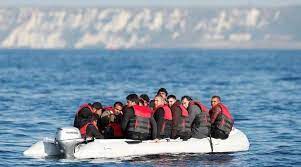Hundreds jailed for coming to UK in small boats to claim asylum, says report

London: Hundreds of people, including children and victims of trafficking and torture, have been convicted and jailed for arriving in the UK in small boats to claim asylum, according to a report.
The prosecutions have largely slipped under the radar, although the issue has been highlighted by the case of the Senegalese teenager Ibrahima Bah. He was sentenced to nine years and six months detention after being convicted of four counts of manslaughter and one of facilitating a breach of immigration law after steering an overcrowded dinghy that got into difficulty, leading to the drowning of at least four people.
The report, called No Such Thing as Justice Here, from the Centre for Criminology at the University of Oxford and Border Criminologies, examined the cases of people who have been imprisoned for their arrival on a “small boat” since the Nationality and Borders Act (2022) came into force. It used a mix of attendance at more than 100 court hearings, as well as freedom of information requests and interviews with lawyers, convicted asylum seekers convicted and interpreters.
The NGOs Humans for Rights Network, Captain Support UK and Refugee Legal Support contributed to the report.
It found that the prosecutions have not acted as a deterrent for Channel crossings and calls for an end to criminalisation at the border.
Between June 2022 and October 2023, 253 people were convicted under section 24 of the 1971 Immigration Act for illegal entry and seven under section 25 of that act for facilitation. According to the research, those targeted for prosecution were either boat drivers like Bah or had immigration history in the UK such as having made a previous visa application.
In 2021, a series of successful appeals overturned prosecutions under these sections of the 1971 Immigration Act. In response, in June 2022, the Nationality and Borders Act expanded the scope of criminal offences relating to irregular arrival to the UK. The offence of “illegal arrival” was introduced, with a maximum sentence of four years, and the offence of “facilitation” was expanded with the maximum sentence increased from 14 years to life imprisonment.
In 2022, one person for every 10 boats was arrested for their alleged role in steering. In 2023, this increased to one for every seven boats.
People have been identified as having their “hand on the tiller” for many reasons, including having boating experience, steering in return for discounted passage, taking it in turns, or being under duress.
Those arrested included people from countries with a high asylum grant rate, including Sudan, South Sudan, Afghanistan, Iran, Eritrea and Syria.
Children in age disputes have been charged as adults with the offences of “illegal arrival” and “facilitation” for their alleged role in steering boats across the Channel.
Humans for Rights Network has identified 15 age-disputed children who were wrongly treated as adults following Home Office age assessments and charged with these new offences, with 14 spending time in adult prison. They believe there are likely to be more cases.
So far, five have been confirmed to be children and the outcome of age assessments is awaited for the others. The majority of these age-disputed young people are Sudanese or South Sudanese, who have travelled to the UK via Libya.
Ibrahim, from Sudan, who was sentenced to 15 months for illegal arrival and facilitation after being identified with his “hand on the tiller” said after being told he was being arrested: “I said no, I am not guilty. If I am guilty, then so is everyone, all 30 or more people on the boat. I laugh when people say about justice in UK, about human rights. There are none here. There is no such thing as justice here.”
Victoria Taylor, the author of No Such Thing as Justice Here, and a researcher at the Centre for Criminology, University of Oxford, said: “This research report evidences the criminalisation and imprisonment of people for crossing the Channel on ‘small boats’.
“It raises questions about the compatibility of the prosecutorial strategy with the refugee convention, as well as the lawful treatment of victims of trafficking, torture, and children with ongoing age disputes.”
A Home Office spokesperson said:“The language used in this report is misleading. Most asylum seekers arriving in the UK by small boat are initially detained for 24 hours or less.
“Asylum seekers should seek protection in the first country where it is reasonable for them to do so and we continue to take robust action to crackdown on criminal gangs and deter migrants from these making dangerous, illegal and unnecessary journeys across the Channel.”





